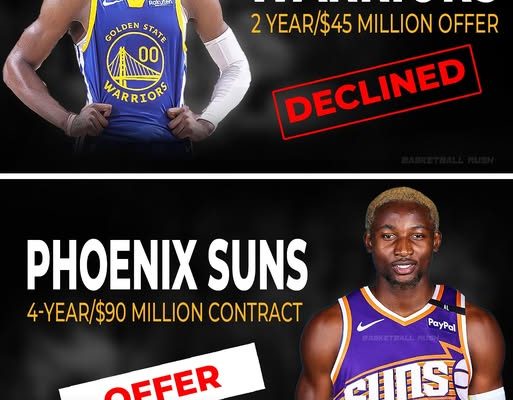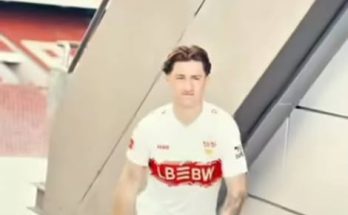The Phoenix Suns are done waiting. No more treading water. No more playing it safe. In a bold, calculated, and statement-making move, the Suns have decided to offer Golden State Warriors forward Jonathan Kuminga a lucrative $90 million deal over four years—nearly twice the estimated extension that Golden State was reportedly preparing. This is not just about acquiring talent. This is about intent, direction, and a complete philosophical reset for a franchise that has spent the last two years drowning under the weight of expectations. The Suns are not rebuilding—they’re reloading, and Kuminga might just be the first cannon they fire in what looks like a full-scale youth-and-athleticism revolution. With this offer, Phoenix is no longer whispering their intentions. They are screaming it loud enough for every front office in the NBA to hear: We’re coming for blood.
Jonathan Kuminga is only 22 years old, but his trajectory feels like it’s been stifled by a Warriors system more suited to 35-year-old veterans than a raw athletic force just entering his prime. While Kuminga has shown flashes—elite finishes, explosive drives, and disruptive defense—he’s never truly been unlocked in the Golden State ecosystem. Too often, he’s been the odd man out in a Steph Curry-Draymond Green-Klay Thompson rhythm that demands high-IQ off-ball movement and a nuanced feel for a championship system that’s allergic to growing pains. Kuminga doesn’t need nuance. He needs freedom. He needs touches. He needs a coach who believes in letting him make his own imprint on the game rather than restricting him to the margins. That’s what Phoenix is betting on: the idea that Jonathan Kuminga, unshackled, will become the two-way menace he was always meant to be.
It’s not just about paying Kuminga, either. It’s about beating the Warriors at their own game. The Suns know that $90 million over four years is steep, especially for a player who averaged just 16.1 points and 4.8 rebounds in limited minutes last season. But it’s also strategic. The Warriors, stuck between two timelines and burdened by luxury tax concerns, were reportedly willing to offer Kuminga closer to $50 million over four years—a figure that clearly undervalues his potential ceiling in the modern NBA. Phoenix stepping in with nearly double that amount is not just a contract offer. It’s an act of war. It’s a sign that Phoenix wants Kuminga badly and they’re willing to pay a premium to both secure his services and cripple a rival’s developmental pipeline. If Golden State doesn’t match—and they might not—the Suns not only add a rising star, but they directly weaken a Western Conference stalwart.
For Phoenix, this is about more than Kuminga. It’s about building a new core identity centered around athleticism, switchability, and positional versatility. After years of depending on aging veterans like Chris Paul, Kevin Durant, and even Bradley Beal to deliver playoff success, the Suns have realized that you can’t cheat the grind. You can’t shortcut your way to a title by stacking names on a roster and praying the chemistry works itself out. The 2024-25 season was supposed to be the year it all came together for Phoenix’s star-laden trio. Instead, it collapsed. Injury management, inconsistent rotations, and a glaring lack of defensive depth exposed the cracks in their high-risk experiment. The Suns didn’t just fail. They were outclassed. That’s not something you ignore. That’s something you correct—immediately.
In comes Kuminga, and perhaps more to follow. The Suns are reportedly exploring other young targets across the league, and league sources have hinted that Phoenix is “aggressively shopping” veteran assets in pursuit of more youthful, athletic contributors who fit the pace-and-space, defensive-minded mold new management wants. This is a complete reset—not of expectations, but of priorities. The message is clear: We’re not afraid of the unknown anymore. We’re embracing the volatility that comes with youth because we believe our structure, our vision, and our hunger can transform raw talent into playoff-caliber production.
That hunger is not to be underestimated. The Suns feel the sting of recent playoff failures. They remember being up 2-0 in the 2021 Finals before Milwaukee ripped their hearts out in four straight. They remember the Denver Nuggets turning their defense into a turnstile in 2023. And they absolutely remember the way Minnesota embarrassed them this past postseason. These weren’t just losses—they were lessons. And Phoenix is finally learning. You don’t win championships with name recognition. You win with hunger, legs, and belief. You win with guys who haven’t yet gotten their payday and are playing like every possession is a career-defining moment. That’s what Kuminga brings. That’s what this $90 million investment is about. It’s not a gamble. It’s a declaration.
Phoenix isn’t flying blind, either. They’ve been eyeing Kuminga for a while, dating back to last season’s trade deadline when internal discussions were reportedly held about potentially prying him away from Golden State in a three-team deal. That never materialized, largely because the Warriors were reluctant to move him without getting elite win-now talent in return. But this offseason, with the Warriors’ luxury tax dilemma looming and Kuminga’s extension clock ticking, the Suns sensed opportunity. They moved fast. They moved big. And now they’re daring Golden State to match a deal they likely can’t justify under their current financial stranglehold. It’s a power play rooted in realism. Phoenix knows they need more youth. They know their current build is unsustainable. So they’re acting like a franchise with a window to maximize, not merely one to admire.
The locker room is expected to shift drastically with Kuminga’s arrival. According to sources close to the Suns, the front office and coaching staff view Kuminga as a future defensive anchor—someone who can switch 1-through-5 and guard the league’s best wings while adding vertical athleticism to their transition game. In fact, internal projections have Kuminga penciled in as a day-one starter at the three, with the potential to eventually be a stretch four as his perimeter game matures. And make no mistake, the Suns fully expect his offensive game to flourish. “We’re not bringing Kuminga here to play the same role he played in Golden State,” one team source said. “We’re giving him the keys to drive.”
This also represents a philosophical buy-in from Suns head coach Mike Budenholzer, who has reportedly signed off on a more player-development-focused strategy moving forward. Known for maximizing athletic wings in his previous stops with Atlanta and Milwaukee, Budenholzer views Kuminga as a high-ceiling project who can explode in the right structure. It’s reminiscent of what Milwaukee did with Giannis in his early years: raw, unpolished, but undeniably powerful. Phoenix knows Kuminga’s game isn’t perfect, but they also know that at 22, perfection isn’t the goal—unleashed potential is.
And maybe, just maybe, this is the moment where the Suns rebrand themselves—not just in narrative, but in substance. Gone is the desperate franchise clinging to the final sparks of Chris Paul’s leadership. Gone is the one-dimensional offense where isolation ruled the day and the bench contributed little more than breathers. The Suns want to run. They want to fly. They want to play like a team that can punch you in the mouth, then chase you down on the other end and do it again. Kuminga fits that mold. And the fact that they’re offering nearly double what Golden State proposed says everything about their belief.
Of course, critics will argue the money is excessive. That $22.5 million per year is a massive gamble for a player who hasn’t consistently started in his young career. But this is the new NBA economy. You don’t pay players for what they’ve already done—you pay them for what you believe they’re about to do. The Suns believe Kuminga is about to blow up. And in a Western Conference where youth is overtaking legacy—see Minnesota, see Oklahoma City—it’s the only logical direction.
This is not just a signing. It’s a message. The Suns are no longer scared to make aggressive moves. No longer beholden to aging stars or flashy headlines. They’re pivoting. They’re adapting. And in offering Kuminga a deal that might just reset the forward market for young two-way wings, they’re telling the NBA: We’re not just retooling. We’re hunting. We’re running straight through the walls that stopped us before. And if you’re in the way?



